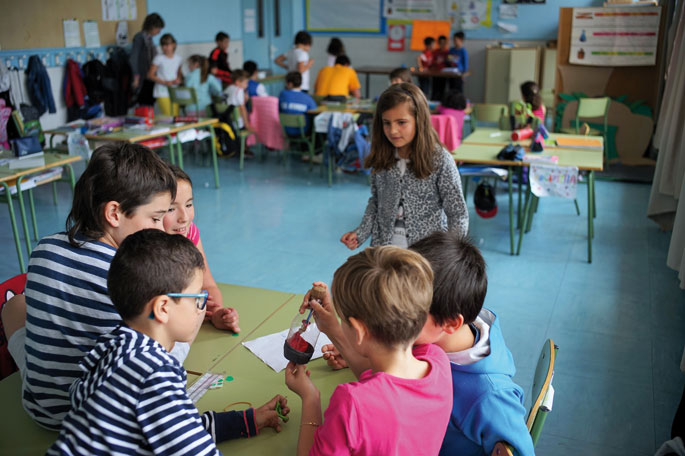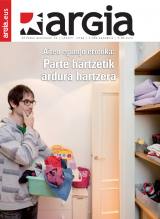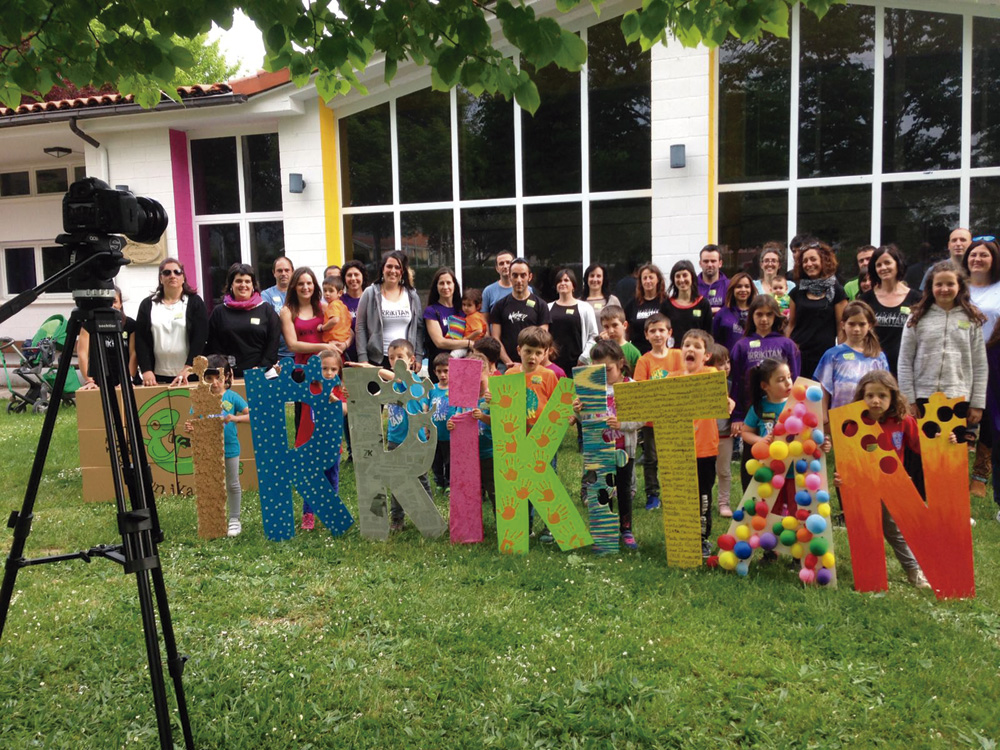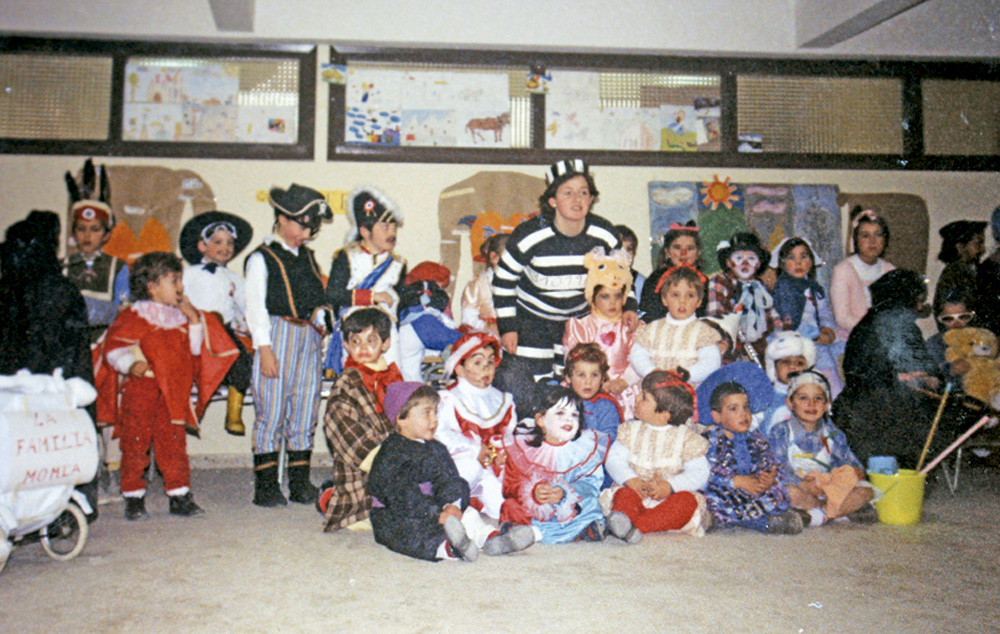Joint assessment of teachers and students without a grade
- Instead of ordinary exams and notes, teachers and students are learning to jointly evaluate in San Vicente, the Oyón ikastola organized this year by the Euskaraz Araba. The students are assuming responsibilities in the learning process and the teaching staff is in the same direction.

Read the lesson, listen to the teacher, present the group work, do the exam and receive a note. The learning process tends to be that way. How are students' knowledge qualified, but students actually acquire content and skills? How can evaluation contribute to improving the learning process? At Oyón's San Bizente Ikastola, we are working on educational evaluation, evaluation-based learning. It has been a great revolution for the ikastola and are satisfied with the results: the faculty has managed to reach agreement on the evaluation criteria; the students have assumed responsibilities in the learning process. Teachers and students are more aware of what they are going to class.
Three years ago, a special program began in Saint Vincent. The director of the ikastola, Gema Berzal, explained that the way of working has changed radically: “This has given us light. There’s a lot of work to do, but come on.” They conduct training sessions in the cloister with the help of María Galdeano, Head of Evaluation and Improvement of the Federation of Ikastolas. Galdeano explained that the key questions of teachers have been modified: From the question “What do I have to teach?” they have moved to the question “what should they learn and for what?”, shifting the focus from teaching to learning. Oyón ikastola and three other ikastolas from Euskal Herria are developing these practices based on evaluation.
Integrating evaluation into the learning process
According to María Galdeano, “having three clear processes in any teaching-learning situation is key if we want to improve learning.” Teachers and students should be aware of these three processes: Where is/am I in learning? where should it go? And what is the best way to get there? Based on these questions, five strategies are being worked on: to clarify and share objectives and success criteria; to generate effective debates and activities to obtain evidence of learning; to provide effective feedback for students to have mutual learning resources; and to promote practices for students to be aware of their own learning.
Target setting. This is the first job teachers have to do. Joint decisions setting clear and precise objectives in the cloister. So far, they've done the test on language subjects and they're about to start the next course on mathematics. It has mainly been applied in primary schools. It is about defining what the students will learn and the competencies they will develop, and then informing the students of these objectives. In the learning process, students and faculty will have clear competencies that will be worked on, and in the evaluation they will also be together. Students will be able to evaluate themselves and decide how to make improvements.
Fellow resources
Galdeano explained that the work between colleagues and colleagues is important: “They can learn more with their peers and peers than with the teachers and, in addition, learn both those who do not have difficulties and those who have difficulties.” Colleagues themselves become learning resources and cooperative work is encouraged.
Self-evaluation of students
Professors have agreed in the campus that students also know what the purpose of their learning process is and that the keys to success are the goal. The faculty then performs a self-evaluation of the tools offered and is able to identify whether or not it has had difficulties with the criteria to achieve the objectives. To collaborate in this evaluation, the faculty exposes students to positive and improved evidence observed in the activity. They highlight the well-done aspects, identifying the accounts that can be improved and explaining how they can be improved. From the knowledge of these evidences or tests, the students have the opportunity to improve their activities. Instead of operating through notes, they perform the evaluation through comments. The director of the ikastola explained that they intend not to use the term of examination. The trainer Galdeano also highlighted this: “The faculty says that they do not need the exams, because otherwise they receive enough evidence to evaluate the students. What should be behind the note, the result obtained in a final test or the development of the whole process?” With the previous system, students have been rated instead of evaluating: “They are graded, they are graded, and that cannot be a way to be evaluated in compulsory education, because it does not allow the improvement of learning.”
In San Vicente you can't raise your hand
The teacher asks something to his colleagues and the one who knows raises his hand. It's a tradition that's deeply rooted in the classroom to raise your hand. In St. Vincent they want to change customs: they cannot raise their hands. In Galdeano’s words, “teachers randomly choose who is going to answer, but we don’t just want to hear the right answers, we want to hear the answers of all the students, the right ones and the wrong ones.” Thus, it is intended to ensure the involvement of all classmates and classmates, as well as the understanding of the contents by students.
Improvements within the Ikastola
At the Ikastola de Oyón they will have one more year of training focused on evaluation. As part of their work, and to evaluate their work and know what to improve, they make observations in classrooms during two observation courses. These observations are called learning pathways.
Since the start of the evaluation based project, changes have been detected. “The atmosphere in the classrooms has changed, and the role of the students has changed completely,” says Galdeano. Now, students are more aware of their own learning process and are assuming responsibility for this process. The faculty is also satisfied with the experience: “We have seen that from a unified philosophy we can go to what we want,” Berzale said. According to the director of the ikastola of Oyón, in the Diagnostic Evaluation the results of the students have improved considerably.
Oyón teachers are convinced that with this work they have improved the learning process and made progress in the autonomy of students. They're learning to answer questions, especially two key questions: “What are we going to learn?” and “How do we know we have learned?”
Ekainaren 17an ospatuko dute Araba Euskaraz Argantzunen. Bertako ikastolak Manzanosen duen Lehen Hezkuntzako eraikina ordaintzen laguntzeko baliatuko dute jaia.




















